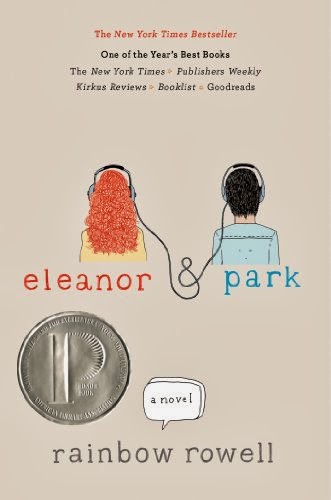I’m a bit late in coming to this one. I was late in reading it, too, by the time it crossed my desk for Round 2 of the Cybils, and I have to admit—it’s often a death sentence (or at least a wrench in the works) when a book has been hyped as much as this one was before I got around to reading it. I’ll freely admit it’s a personal quirk of mine: I tend to get all weird when “everyone else” likes something, and my own interest wanes.
The reason I bring that up is, it could well have made me more vigilant for flaws than I would be otherwise. I do my best to give all Cybils candidates a fair shake, though, and so I hope I wasn’t any more nit-picky with this one than I was with the other finalists.
Anyway, on to the book: Eleanor & Park by Rainbow Rowell. Awards and acclaim aside, there was a lot I personally really liked about this story. The connection develops sweetly and naturally between the two main characters, both misfits for very different reasons. (And I love it that Park is a multiracial character, though that could have been brought out a bit more.) The strength of this book is, above all, its realism—an authentic portrayal of the awkwardness and fumbling and happiness of a first love that transcends time period (this one’s set in the 1980s) and feels familiar and relatable.
The everyday (and not-so-everyday) dramas of school, of family, are realistic, absorbing, and suspenseful, and against this backdrop, the ups and downs and misunderstandings of Park and Eleanor’s developing relationship form a believable counterpoint as they move from friendship to something more. Together, they can do more—be more—than they’ve been able to do alone thus far, but of course, each of them has to embrace their individual inner strength in order to continue to grow—and that’s something that has to be done on one’s own.
That’s really the most I can say without ending-related spoilers, but it WAS a very good ending, very appropriate and satisfying.
The beginning, however, felt a bit slow—I’ll admit here that this is probably a love-it-or-hate-it thing, that many readers may enjoy the gradual unfolding of the characters and their world, but I wanted more clarity, more movement, right off. But I’m not a fan of the romance genre generally, and while this isn’t a “romance novel,” it is a story *of* romance, and so I may not be the best person to judge its tropes.
The other aspect of the book that nagged at me (and I hate to be critical of this, because again, very subjective) was an ongoing sense of indulgence in the writing. I felt it rode the line, at times, between authentic teenage angst and a feeling that the writing was overwrought. A matter of opinion, I’m sure.
In a similar vein, there are the 1980s references. This is something people NEVER seem to agree on: whether setting a book in a time period as recent as the 70s or 80s or 90s is going to even appeal to a contemporary teen reader. I’m on the fence about that sort of thing in general, and in this specific case, there were times when I thought it was fine and times when it didn’t work for me. Given that the book is, in some ways, aimed squarely at ME, since I grew up in the 80s (albeit a few crucial years younger than the characters in question), I understood the vast majority of the pop culture references. But on the few occasions where I didn’t get it, it REALLY brought me out of the story. I suspect that teen readers would be even more confused.
That made me wonder about the intended audience for the book vs. the actual audience. And certainly it’s been a very popular title among adult readers, as I understand it, so it’s interesting that this one was ostensibly marketed to a YA audience—I guess that makes it a true crossover, though, which is rare enough and a positive thing. Overall, I liked the book a lot—truly I did—but I was not struck with the same Book Love that many others were. I suspect much of that is a case of Not My Genre.
You can find Eleanor and Park by Rainbow Rowell online, or at an independent bookstore near you!

INTERESTING take on it, Sarah. Other reviews I've found have also discussed this book as racist, which I found interesting. Haven't read it yet myself.
That's interesting indeed…It did not strike me as racist, but it did sort of gloss over lots of the potential and/or very real complications that went along with being of mixed race, and of being Asian American specifically, in the 1980s. That was another reason for me to put it in the romance genre to some extent–I don't think it was the purpose of the book to analyze the subtleties of race and ethnicity. And no book can be all things to all people, certainly. It was not one of my major complaints by any means.